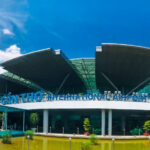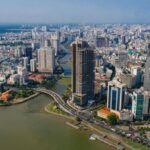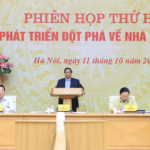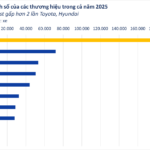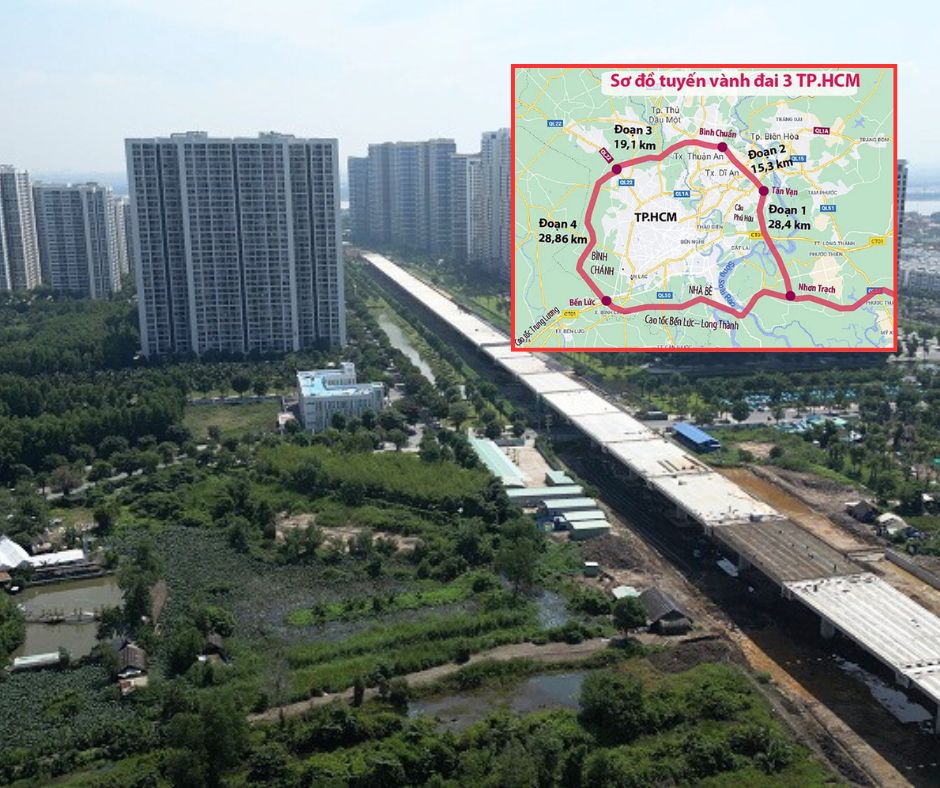
Illustrative image
Proposal to Increase the Income Threshold for Social Housing Eligibility to VND 40 Million/Month for Couples
On the afternoon of October 10th, Deputy Prime Minister Tran Hong Ha chaired a meeting to review the draft decree amending and supplementing certain provisions of Decree No. 100 (2024) issued by the Government. This decree details the implementation of the Housing Law regarding the development and management of social housing. Additionally, it amends Decree No. 192, which outlines specific mechanisms and policies for piloting social housing development.
According to the Ministry of Construction’s report, a key highlight of the draft decree is the amendment and supplementation of regulations concerning land use obligations for developers. This change allows developers to pay a fee instead of allocating 20% of their project land for social housing construction.
The draft stipulates that the land use fee for the entire project will be determined according to current land laws. The additional payment for the 20% residential land area, approved for fee payment, will be calculated at 3% per year of the land use fee for this area. This calculation is based on the progress of completing the technical infrastructure system as approved.
Dong Nai Province Plans to Start and Complete Over 9,000 Social Housing Units Next Year
Reporting to the Ministry of Construction, Vice Chairman of Dong Nai Provincial People’s Committee Ho Van Ha stated that Dong Nai has allocated over 1,000 hectares of land for independent social housing projects. Additionally, more than 300 hectares of land from the 20% area designated for social housing within commercial housing projects have been set aside.
Essentially, Dong Nai Province has sufficient land to meet the social housing development target of nearly 65,000 units by 2030, as assigned by the Government.
Some rural areas currently zoned for low-rise individual housing no longer comply with the 2023 Housing Law, which primarily defines social housing as apartment buildings, except in ethnic minority and mountainous regions. Therefore, the province plans to review and adjust its plans, reallocating land to more suitable locations.
Regarding the new special policies issued in 2025, Dong Nai has approved investment guidelines for 10 projects, totaling 11,000 units.
100-Day Sprint: Ho Chi Minh City’s Ring Road 3 to Open by Year-End
Following the signing of a commitment to accelerate the technical completion of certain sections of Ho Chi Minh City’s Ring Road 3 project, construction units are intensifying efforts to meet the December 19th deadline.
According to the Transport Board, Component 1 of the Ring Road 3 project, spanning Ho Chi Minh City, is accelerating the implementation of 10 main construction packages, with progress reaching approximately 60% of the contract value.
On September 19th, the Transport Board organized a signing ceremony for a 100-day competition agreement among investors, contractors, and supervision consultants. This agreement aims to expedite construction and achieve technical completion of certain sections as directed by Deputy Prime Minister Mai Van Chinh on October 1st.
Specifically, the 12.8 km elevated section in the former Thu Duc area (from the HLD intersection to the ramp connecting to the Dong Tron Bridge area) will be technically completed by December 19th. By April 30, 2026, the entire 14.7 km elevated section, along with the Tan Van intersection (part of Component 5 in the former Binh Duong area), will be fully operational.
In the former Cu Chi, Hoc Mon, and Binh Chanh areas, the 32.6 km section on the macadam foundation will be opened by December 19th, with the entire 32.6 km expressway section officially opening by April 30, 2026.
Lam Dong Province Reports 296 Projects Facing Difficulties and Obstacles
The main challenges include land procedures, site clearance, planning, forest land conversion, and construction investment procedures. Many projects are delayed due to a lack of detailed planning, slow land price determination, forest conversion regulations, incomplete transport infrastructure, or the need to adjust project scales to comply with new regulations.
The tourism sector leads with 93 problematic projects, primarily around Tuyen Lam Lake and key tourist areas. This is followed by the industry, energy, and trade sector with 66 projects, the residential and urban sector with 47 projects, and the healthcare and education sector with 7 projects.
To address these issues, the Department of Finance proposes that the Provincial People’s Committee establish interdisciplinary working groups by sector, led by department heads. These groups will review, request detailed reports from investors, conduct site inspections, categorize projects, compile issues, and propose specific solutions for each sector, to be submitted to the Provincial People’s Committee for direction.
For non-budget projects updated on the 751 database system, the Department of Finance will continue monitoring and advising the Provincial People’s Committee following central government directives.
New Information on Resolving Bottlenecks for Nearly 3,000 Stalled Projects
On October 9th, Deputy Prime Minister Nguyen Hoa Binh signed a telegram from the Prime Minister urging the swift completion of a comprehensive review, information updates, and a full list of proposals for solutions and authorities to issue mechanisms and policies to address difficulties and bottlenecks for long-stalled projects on the 751 System.
The telegram emphasizes that on August 20th, the Prime Minister issued a telegram on effectively implementing solutions to promptly resolve difficulties and bottlenecks for stalled projects to ensure immediate deployment.
The Prime Minister requests that ministries, agencies, and localities continue to comprehensively review, update information, and fully list projects facing difficulties, bottlenecks, and prolonged delays within their management scope. They are responsible for accurately and completely implementing the content and information as required on the 751 Steering Committee’s database system (751 System).
However, many ministries, agencies, and localities have not yet completed updating, reviewing, proposing solutions, and determining authorities to issue mechanisms and policies to address bottlenecks for long-stalled projects under their management. As of October 7th, the 751 System has only recorded review results for 1,596 out of 2,991 projects from 17 localities and 6 ministries and agencies; 2 localities have no problematic projects; and 1,395 projects from 15 localities and 8 ministries and agencies have not conducted reviews, categorizations, and solution proposals.
Hanoi and Ho Chi Minh City to Review and Adjust Planning Around Stations and Depots for TOD Urban Development
The Government has issued Resolution No. 318/NQ-CP on the implementation plan for National Assembly Resolution No. 188/2025/QH15, which pilots special mechanisms and policies for developing the urban railway network system in Hanoi and Ho Chi Minh City. This resolution takes effect from October 9, 2025.
The plan aims to institutionalize and fully implement the viewpoints, goals, tasks, and solutions outlined in National Assembly Resolution No. 188/2025/QH15. It also clearly defines tasks for ministries, agencies, and localities to carry out activities related to investment preparation, investment in urban railway routes, TOD-oriented urban development, industrial development, and railway human resource training.
This plan serves as a basis for the Government, Prime Minister, and ministries, agencies, and localities to focus on directing, organizing implementation, ensuring compliance with legal regulations, progress, quality, and tight management. It also ensures efficient, economical, and transparent capital use.
The resolution highlights that urban railway projects in Hanoi and Ho Chi Minh City are large-scale, with high technical and technological requirements, and urgent implementation schedules. The National Assembly has permitted the application of many special mechanisms and policies for their execution.
Proposed Recommendations to the Ministry of Construction Regarding Can Tho Airport
The People’s Committee of Can Tho City has urged the Ministry of Construction to promptly approve the investment policy for the upgrade of Can Tho International Airport. The project aims to increase the airport’s capacity to 7 million passengers annually in phase 1, with a further expansion to 12 million passengers per year in phase 2, significantly boosting regional development.
Văn Phú Expands Development into Southern Market
The Southern real estate market, centered around the emerging Ho Chi Minh City, is witnessing a significant investment surge from leading property developers. This wave is marked by a series of large-scale projects poised to transform the urban landscape entirely. This trend aligns with a strategic vision focused on critical transportation and infrastructure hubs within the city, aiming to redefine traffic flow and commercial dynamics across the entire Southern Key Economic Region.
Elevate Social Housing Income Threshold for Couples to VND 40 Million/Month
The government has recently issued Decree 261, raising the income threshold for eligibility to purchase or rent social housing to 20 million VND/month for individuals, 40 million VND/month for married couples, and 30 million VND/month for single parents with children. This new regulation is expected to expand access to social housing for millions of middle-income workers in major urban areas.
Cần Giờ No Longer Stands Alone
Experts believe that following Ho Chi Minh City’s administrative boundary expansion, Can Gio is entering a new phase of development with a significantly enhanced status compared to before. When integrated into the city’s overall development plan, Can Gio will emerge as a crucial link in the interconnected urban-coastal tourism chain, which includes Can Gio – Vung Tau – Long Hai – Ho Tram.
Vietnam’s Most Populous City to Launch $380 Million Overpass and Underpass Project, Aiming to Alleviate Eastern Gateway Congestion
Later this year, Ho Chi Minh City will commence construction on Phase 1 of the Ring Road 2 and the Binh Thai Interchange. Upon completion, this project will significantly enhance the Eastern region’s transportation network, alleviate traffic congestion, and bolster regional connectivity.

